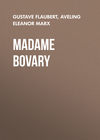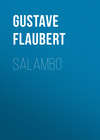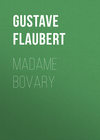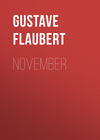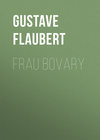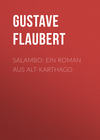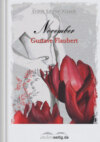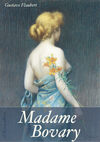Buch lesen: «Madame Bovary», Seite 7
Then the peasant woman, taking her aside behind an elm tree, began talking to her of her husband, who with his trade and six francs a year that the captain —
“Oh, be quick!” said Emma.
“Well,” the nurse went on, heaving sighs between each word, “I’m afraid he’ll be put out seeing me have coffee alone, you know men – ”
“But you are to have some,” Emma repeated; “I will give you some. You bother me!”
“Oh, dear! my poor, dear lady! you see in consequence of his wounds he has terrible cramps in the chest. He even says that cider weakens him.”
“Do make haste, Mere Rollet!”
“Well,” the latter continued, making a curtsey, “if it weren’t asking too much,” and she curtsied once more, “if you would” – and her eyes begged – “a jar of brandy,” she said at last, “and I’d rub your little one’s feet with it; they’re as tender as one’s tongue.”
Once rid of the nurse, Emma again took Monsieur Leon’s arm. She walked fast for some time, then more slowly, and looking straight in front of her, her eyes rested on the shoulder of the young man, whose frock-coat had a black-velvety collar. His brown hair fell over it, straight and carefully arranged. She noticed his nails which were longer than one wore them at Yonville. It was one of the clerk’s chief occupations to trim them, and for this purpose he kept a special knife in his writing desk.
They returned to Yonville by the water-side. In the warm season the bank, wider than at other times, showed to their foot the garden walls whence a few steps led to the river. It flowed noiselessly, swift, and cold to the eye; long, thin grasses huddled together in it as the current drove them, and spread themselves upon the limpid water like streaming hair; sometimes at the tip of the reeds or on the leaf of a water-lily an insect with fine legs crawled or rested. The sun pierced with a ray the small blue bubbles of the waves that, breaking, followed each other; branchless old willows mirrored their grey backs in the water; beyond, all around, the meadows seemed empty. It was the dinner-hour at the farms, and the young woman and her companion heard nothing as they walked but the fall of their steps on the earth of the path, the words they spoke, and the sound of Emma’s dress rustling round her.
The walls of the gardens with pieces of bottle on their coping were hot as the glass windows of a conservatory. Wallflowers had sprung up between the bricks, and with the tip of her open sunshade Madame Bovary, as she passed, made some of their faded flowers crumble into a yellow dust, or a spray of overhanging honeysuckle and clematis caught in its fringe and dangled for a moment over the silk.
They were talking of a troupe of Spanish dancers who were expected shortly at the Rouen theatre.
“Are you going?” she asked.
“If I can,” he answered.
Had they nothing else to say to one another? Yet their eyes were full of more serious speech, and while they forced themselves to find trivial phrases, they felt the same languor stealing over them both. It was the whisper of the soul, deep, continuous, dominating that of their voices. Surprised with wonder at this strange sweetness, they did not think of speaking of the sensation or of seeking its cause. Coming joys, like tropical shores, throw over the immensity before them their inborn softness, an odorous wind, and we are lulled by this intoxication without a thought of the horizon that we do not even know.
In one place the ground had been trodden down by the cattle; they had to step on large green stones put here and there in the mud.
She often stopped a moment to look where to place her foot, and tottering on a stone that shook, her arms outspread, her form bent forward with a look of indecision, she would laugh, afraid of falling into the puddles of water.
When they arrived in front of her garden, Madame Bovary opened the little gate, ran up the steps and disappeared.
Leon returned to his office. His chief was away; he just glanced at the briefs, then cut himself a pen, and at last took up his hat and went out.
He went to La Pature at the top of the Argueil hills at the beginning of the forest; he threw himself upon the ground under the pines and watched the sky through his fingers.
“How bored I am!” he said to himself, “how bored I am!”
He thought he was to be pitied for living in this village, with Homais for a friend and Monsieru Guillaumin for master. The latter, entirely absorbed by his business, wearing gold-rimmed spectacles and red whiskers over a white cravat, understood nothing of mental refinements, although he affected a stiff English manner, which in the beginning had impressed the clerk.
As to the chemist’s spouse, she was the best wife in Normandy, gentle as a sheep, loving her children, her father, her mother, her cousins, weeping for other’s woes, letting everything go in her household, and detesting corsets; but so slow of movement, such a bore to listen to, so common in appearance, and of such restricted conversation, that although she was thirty, he only twenty, although they slept in rooms next each other and he spoke to her daily, he never thought that she might be a woman for another, or that she possessed anything else of her sex than the gown.
And what else was there? Binet, a few shopkeepers, two or three publicans, the cure, and finally, Monsieur Tuvache, the mayor, with his two sons, rich, crabbed, obtuse persons, who farmed their own lands and had feasts among themselves, bigoted to boot, and quite unbearable companions.
But from the general background of all these human faces Emma’s stood out isolated and yet farthest off; for between her and him he seemed to see a vague abyss.
In the beginning he had called on her several times along with the druggist. Charles had not appeared particularly anxious to see him again, and Leon did not know what to do between his fear of being indiscreet and the desire for an intimacy that seemed almost impossible.
Chapter Four
When the first cold days set in Emma left her bedroom for the sitting-room, a long apartment with a low ceiling, in which there was on the mantelpiece a large bunch of coral spread out against the looking-glass. Seated in her arm chair near the window, she could see the villagers pass along the pavement.
Twice a day Leon went from his office to the Lion d’Or. Emma could hear him coming from afar; she leant forward listening, and the young man glided past the curtain, always dressed in the same way, and without turning his head. But in the twilight, when, her chin resting on her left hand, she let the embroidery she had begun fall on her knees, she often shuddered at the apparition of this shadow suddenly gliding past. She would get up and order the table to be laid.
Monsieur Homais called at dinner-time. Skull-cap in hand, he came in on tiptoe, in order to disturb no one, always repeating the same phrase, “Good evening, everybody.” Then, when he had taken his seat at the table between the pair, he asked the doctor about his patients, and the latter consulted his as to the probability of their payment. Next they talked of “what was in the paper.”
Homais by this hour knew it almost by heart, and he repeated it from end to end, with the reflections of the penny-a-liners, and all the stories of individual catastrophes that had occurred in France or abroad. But the subject becoming exhausted, he was not slow in throwing out some remarks on the dishes before him.
Sometimes even, half-rising, he delicately pointed out to madame the tenderest morsel, or turning to the servant, gave her some advice on the manipulation of stews and the hygiene of seasoning.
He talked aroma, osmazome, juices, and gelatine in a bewildering manner. Moreover, Homais, with his head fuller of recipes than his shop of jars, excelled in making all kinds of preserves, vinegars, and sweet liqueurs; he knew also all the latest inventions in economic stoves, together with the art of preserving cheese and of curing sick wines.
At eight o’clock Justin came to fetch him to shut up the shop.
Then Monsieur Homais gave him a sly look, especially if Felicite was there, for he half noticed that his apprentice was fond of the doctor’s house.
“The young dog,” he said, “is beginning to have ideas, and the devil take me if I don’t believe he’s in love with your servant!”
But a more serious fault with which he reproached Justin was his constantly listening to conversation. On Sunday, for example, one could not get him out of the drawing-room, whither Madame Homais had called him to fetch the children, who were falling asleep in the arm-chairs, and dragging down with their backs calico chair-covers that were too large.
Not many people came to these soirees at the chemist’s, his scandal-mongering and political opinions having successfully alienated various respectable persons from him. The clerk never failed to be there. As soon as he heard the bell he ran to meet Madame Bovary, took her shawl, and put away under the shop-counter the thick list shoes that she wore over her boots when there was snow.
First they played some hands at trente-et-un; next Monsieur Homais played ecarte with Emma; Leon behind her gave her advice.
Standing up with his hands on the back of her chair he saw the teeth of her comb that bit into her chignon. With every movement that she made to throw her cards the right side of her dress was drawn up. From her turned-up hair a dark colour fell over her back, and growing gradually paler, lost itself little by little in the shade. Then her dress fell on both sides of her chair, puffing out full of folds, and reached the ground. When Leon occasionally felt the sole of his boot resting on it, he drew back as if he had trodden upon some one.
When the game of cards was over, the druggist and the Doctor played dominoes, and Emma, changing her place, leant her elbow on the table, turning over the leaves of “L’Illustration”. She had brought her ladies’ journal with her. Leon sat down near her; they looked at the engravings together, and waited for one another at the bottom of the pages. She often begged him to read her the verses; Leon declaimed them in a languid voice, to which he carefully gave a dying fall in the love passages. But the noise of the dominoes annoyed him. Monsieur Homais was strong at the game; he could beat Charles and give him a double-six. Then the three hundred finished, they both stretched themselves out in front of the fire, and were soon asleep. The fire was dying out in the cinders; the teapot was empty, Leon was still reading.
Emma listened to him, mechanically turning around the lampshade, on the gauze of which were painted clowns in carriages, and tight-rope dances with their balancing-poles. Leon stopped, pointing with a gesture to his sleeping audience; then they talked in low tones, and their conversation seemed the more sweet to them because it was unheard.
Thus a kind of bond was established between them, a constant commerce of books and of romances. Monsieur Bovary, little given to jealousy, did not trouble himself about it.
On his birthday he received a beautiful phrenological head, all marked with figures to the thorax and painted blue. This was an attention of the clerk’s. He showed him many others, even to doing errands for him at Rouen; and the book of a novelist having made the mania for cactuses fashionable, Leon bought some for Madame Bovary, bringing them back on his knees in the “Hirondelle,” pricking his fingers on their hard hairs.
She had a board with a balustrade fixed against her window to hold the pots. The clerk, too, had his small hanging garden; they saw each other tending their flowers at their windows.
Of the windows of the village there was one yet more often occupied; for on Sundays from morning to night, and every morning when the weather was bright, one could see at the dormer-window of the garret the profile of Monsieur Binet bending over his lathe, whose monotonous humming could be heard at the Lion d’Or.
One evening on coming home Leon found in his room a rug in velvet and wool with leaves on a pale ground. He called Madame Homais, Monsieur Homais, Justin, the children, the cook; he spoke of it to his chief; every one wanted to see this rug. Why did the doctor’s wife give the clerk presents? It looked queer. They decided that she must be his lover.
He made this seem likely, so ceaselessly did he talk of her charms and of her wit; so much so, that Binet once roughly answered him —
“What does it matter to me since I’m not in her set?”
He tortured himself to find out how he could make his declaration to her, and always halting between the fear of displeasing her and the shame of being such a coward, he wept with discouragement and desire. Then he took energetic resolutions, wrote letters that he tore up, put it off to times that he again deferred.
Often he set out with the determination to dare all; but this resolution soon deserted him in Emma’s presence, and when Charles, dropping in, invited him to jump into his chaise to go with him to see some patient in the neighbourhood, he at once accepted, bowed to madame, and went out. Her husband, was he not something belonging to her? As to Emma, she did not ask herself whether she loved. Love, she thought, must come suddenly, with great outbursts and lightnings – a hurricane of the skies, which falls upon life, revolutionises it, roots up the will like a leaf, and sweeps the whole heart into the abyss. She did not know that on the terrace of houses it makes lakes when the pipes are choked, and she would thus have remained in her security when she suddenly discovered a rent in the wall of it.
Chapter Five
It was a Sunday in February, an afternoon when the snow was falling
They had all, Monsieur and Madame Bovary, Homais, and Monsieur Leon, gone to see a yarn-mill that was being built in the valley a mile and a half from Yonville. The druggist had taken Napoleon and Athalie to give them some exercise, and Justin accompanied them, carrying the umbrellas on his shoulder.
Nothing, however, could be less curious than this curiosity. A great piece of waste ground, on which pell-mell, amid a mass of sand and stones, were a few break-wheels, already rusty, surrounded by a quadrangular building pierced by a number of little windows. The building was unfinished; the sky could be seen through the joists of the roofing. Attached to the stop-plank of the gable a bunch of straw mixed with corn-ears fluttered its tricoloured ribbons in the wind.
Homais was talking. He explained to the company the future importance of this establishment, computed the strength of the floorings, the thickness of the walls, and regretted extremely not having a yard-stick such as Monsieur Binet possessed for his own special use.
Emma, who had taken his arm, bent lightly against his shoulder, and she looked at the sun’s disc shedding afar through the mist his pale splendour. She turned. Charles was there. His cap was drawn down over his eyebrows, and his two thick lips were trembling, which added a look of stupidity to his face; his very back, his calm back, was irritating to behold, and she saw written upon his coat all the platitude of the bearer.
While she was considering him thus, tasting in her irritation a sort of depraved pleasure, Leon made a step forward. The cold that made him pale seemed to add a more gentle languor to his face; between his cravat and his neck the somewhat loose collar of his shirt showed the skin; the lobe of his ear looked out from beneath a lock of hair, and his large blue eyes, raised to the clouds, seemed to Emma more limpid and more beautiful than those mountain-lakes where the heavens are mirrored.
“Wretched boy!” suddenly cried the chemist.
And he ran to his son, who had just precipitated himself into a heap of lime in order to whiten his boots. At the reproaches with which he was being overwhelmed Napoleon began to roar, while Justin dried his shoes with a wisp of straw. But a knife was wanted; Charles offered his.
“Ah!” she said to herself, “he carried a knife in his pocket like a peasant.”
The hoar-frost was falling, and they turned back to Yonville.
In the evening Madame Bovary did not go to her neighbour’s, and when Charles had left and she felt herself alone, the comparison re-began with the clearness of a sensation almost actual, and with that lengthening of perspective which memory gives to things. Looking from her bed at the clean fire that was burning, she still saw, as she had down there, Leon standing up with one hand behind his cane, and with the other holding Athalie, who was quietly sucking a piece of ice. She thought him charming; she could not tear herself away from him; she recalled his other attitudes on other days, the words he had spoken, the sound of his voice, his whole person; and she repeated, pouting out her lips as if for a kiss —
“Yes, charming! charming! Is he not in love?” she asked herself; “but with whom? With me?”
All the proofs arose before her at once; her heart leapt. The flame of the fire threw a joyous light upon the ceiling; she turned on her back, stretching out her arms.
Then began the eternal lamentation: “Oh, if Heaven had not willed it! And why not? What prevented it?”
When Charles came home at midnight, she seemed to have just awakened, and as he made a noise undressing, she complained of a headache, then asked carelessly what had happened that evening.
“Monsieur Leon,” he said, “went to his room early.”
She could not help smiling, and she fell asleep, her soul filled with a new delight.
The next day, at dusk, she received a visit from Monsieur Lherueux, the draper. He was a man of ability, was this shopkeeper. Born a Gascon but bred a Norman, he grafted upon his southern volubility the cunning of the Cauchois. His fat, flabby, beardless face seemed dyed by a decoction of liquorice, and his white hair made even more vivid the keen brilliance of his small black eyes. No one knew what he had been formerly; a pedlar said some, a banker at Routot according to others. What was certain was that he made complex calculations in his head that would have frightened Binet himself. Polite to obsequiousness, he always held himself with his back bent in the position of one who bows or who invites.
After leaving at the door his hat surrounded with crape, he put down a green bandbox on the table, and began by complaining to madame, with many civilities, that he should have remained till that day without gaining her confidence. A poor shop like his was not made to attract a “fashionable lady”; he emphasized the words; yet she had only to command, and he would undertake to provide her with anything she might wish, either in haberdashery or linen, millinery or fancy goods, for he went to town regularly four times a month. He was connected with the best houses. You could speak of him at the “Trois Freres,” at the “Barbe d’Or,” or at the “Grand Sauvage”; all these gentlemen knew him as well as the insides of their pockets. To-day, then he had come to show madame, in passing, various articles he happened to have, thanks to the most rare opportunity. And he pulled out half-a-dozen embroidered collars from the box.
Madame Bovary examined them. “I do not require anything,” she said.
Then Monsieur Lheureux delicately exhibited three Algerian scarves, several packets of English needles, a pair of straw slippers, and finally, four eggcups in cocoanut wood, carved in open work by convicts. Then, with both hands on the table, his neck stretched out, his figure bent forward, open-mouthed, he watched Emma’s look, who was walking up and down undecided amid these goods. From time to time, as if to remove some dust, he filliped with his nail the silk of the scarves spread out at full length, and they rustled with a little noise, making in the green twilight the gold spangles of their tissue scintillate like little stars.
“How much are they?”
“A mere nothing,” he replied, “a mere nothing. But there’s no hurry; whenever it’s convenient. We are not Jews.”
She reflected for a few moments, and ended by again declining Monsieur Lheureux’s offer. He replied quite unconcernedly —
“Very well. We shall understand one another by and by. I have always got on with ladies – if I didn’t with my own!”
Emma smiled.
“I wanted to tell you,” he went on good-naturedly, after his joke, “that it isn’t the money I should trouble about. Why, I could give you some, if need be.”
She made a gesture of surprise.
“Ah!” said he quickly and in a low voice, “I shouldn’t have to go far to find you some, rely on that.”
And he began asking after Pere Tellier, the proprietor of the “Cafe Francais,” whom Monsieur Bovary was then attending.
“What’s the matter with Pere Tellier? He coughs so that he shakes his whole house, and I’m afraid he’ll soon want a deal covering rather than a flannel vest. He was such a rake as a young man! Those sort of people, madame, have not the least regularity; he’s burnt up with brandy. Still it’s sad, all the same, to see an acquaintance go off.”
And while he fastened up his box he discoursed about the doctor’s patients.
“It’s the weather, no doubt,” he said, looking frowningly at the floor, “that causes these illnesses. I, too, don’t feel the thing. One of these days I shall even have to consult the doctor for a pain I have in my back. Well, good-bye, Madame Bovary. At your service; your very humble servant.” And he closed the door gently.
Emma had her dinner served in her bedroom on a tray by the fireside; she was a long time over it; everything was well with her.
“How good I was!” she said to herself, thinking of the scarves.
She heard some steps on the stairs. It was Leon. She got up and took from the chest of drawers the first pile of dusters to be hemmed. When he came in she seemed very busy.
The conversation languished; Madame Bovary gave it up every few minutes, whilst he himself seemed quite embarrassed. Seated on a low chair near the fire, he turned round in his fingers the ivory thimble-case. She stitched on, or from time to time turned down the hem of the cloth with her nail. She did not speak; he was silent, captivated by her silence, as he would have been by her speech.
“Poor fellow!” she thought.
“How have I displeased her?” he asked himself.
At last, however, Leon said that he should have, one of these days, to go to Rouen on some office business.
“Your music subscription is out; am I to renew it?”
“No,” she replied.
“Why?”
“Because – ”
And pursing her lips she slowly drew a long stitch of grey thread.
This work irritated Leon. It seemed to roughen the ends of her fingers. A gallant phrase came into his head, but he did not risk it.
“Then you are giving it up?” he went on.
“What?” she asked hurriedly. “Music? Ah! yes! Have I not my house to look after, my husband to attend to, a thousand things, in fact, many duties that must be considered first?”
She looked at the clock. Charles was late. Then, she affected anxiety. Two or three times she even repeated, “He is so good!”
The clerk was fond of Monsieur Bovary. But this tenderness on his behalf astonished him unpleasantly; nevertheless he took up on his praises, which he said everyone was singing, especially the chemist.
“Ah! he is a good fellow,” continued Emma.
“Certainly,” replied the clerk.
And he began talking of Madame Homais, whose very untidy appearance generally made them laugh.
“What does it matter?” interrupted Emma. “A good housewife does not trouble about her appearance.”
Then she relapsed into silence.
It was the same on the following days; her talks, her manners, everything changed. She took interest in the housework, went to church regularly, and looked after her servant with more severity.
She took Berthe from nurse. When visitors called, Felicite brought her in, and Madame Bovary undressed her to show off her limbs. She declared she adored children; this was her consolation, her joy, her passion, and she accompanied her caresses with lyrical outburst which would have reminded anyone but the Yonville people of Sachette in “Notre Dame de Paris.”
When Charles came home he found his slippers put to warm near the fire. His waistcoat now never wanted lining, nor his shirt buttons, and it was quite a pleasure to see in the cupboard the night-caps arranged in piles of the same height. She no longer grumbled as formerly at taking a turn in the garden; what he proposed was always done, although she did not understand the wishes to which she submitted without a murmur; and when Leon saw him by his fireside after dinner, his two hands on his stomach, his two feet on the fender, his two cheeks red with feeding, his eyes moist with happiness, the child crawling along the carpet, and this woman with the slender waist who came behind his arm-chair to kiss his forehead: “What madness!” he said to himself. “And how to reach her!”
And thus she seemed so virtuous and inaccessible to him that he lost all hope, even the faintest. But by this renunciation he placed her on an extraordinary pinnacle. To him she stood outside those fleshly attributes from which he had nothing to obtain, and in his heart she rose ever, and became farther removed from him after the magnificent manner of an apotheosis that is taking wing. It was one of those pure feelings that do not interfere with life, that are cultivated because they are rare, and whose loss would afflict more than their passion rejoices.
Emma grew thinner, her cheeks paler, her face longer. With her black hair, her large eyes, her aquiline nose, her birdlike walk, and always silent now, did she not seem to be passing through life scarcely touching it, and to bear on her brow the vague impress of some divine destiny? She was so sad and so calm, at once so gentle and so reserved, that near her one felt oneself seized by an icy charm, as we shudder in churches at the perfume of the flowers mingling with the cold of the marble. The others even did not escape from this seduction. The chemist said —
“She is a woman of great parts, who wouldn’t be misplaced in a sub-prefecture.”
The housewives admired her economy, the patients her politeness, the poor her charity.
But she was eaten up with desires, with rage, with hate. That dress with the narrow folds hid a distracted fear, of whose torment those chaste lips said nothing. She was in love with Leon, and sought solitude that she might with the more ease delight in his image. The sight of his form troubled the voluptuousness of this mediation. Emma thrilled at the sound of his step; then in his presence the emotion subsided, and afterwards there remained to her only an immense astonishment that ended in sorrow.
Leon did not know that when he left her in despair she rose after he had gone to see him in the street. She concerned herself about his comings and goings; she watched his face; she invented quite a history to find an excuse for going to his room. The chemist’s wife seemed happy to her to sleep under the same roof, and her thoughts constantly centered upon this house, like the “Lion d’Or” pigeons, who came there to dip their red feet and white wings in its gutters. But the more Emma recognised her love, the more she crushed it down, that it might not be evident, that she might make it less. She would have liked Leon to guess it, and she imagined chances, catastrophes that should facilitate this.
What restrained her was, no doubt, idleness and fear, and a sense of shame also. She thought she had repulsed him too much, that the time was past, that all was lost. Then, pride, and joy of being able to say to herself, “I am virtuous,” and to look at herself in the glass taking resigned poses, consoled her a little for the sacrifice she believed she was making.
Then the lusts of the flesh, the longing for money, and the melancholy of passion all blended themselves into one suffering, and instead of turning her thoughts from it, she clave to it the more, urging herself to pain, and seeking everywhere occasion for it. She was irritated by an ill-served dish or by a half-open door; bewailed the velvets she had not, the happiness she had missed, her too exalted dreams, her narrow home.
What exasperated her was that Charles did not seem to notice her anguish. His conviction that he was making her happy seemed to her an imbecile insult, and his sureness on this point ingratitude. For whose sake, then was she virtuous? Was it not for him, the obstacle to all felicity, the cause of all misery, and, as it were, the sharp clasp of that complex strap that bucked her in on all sides.
On him alone, then, she concentrated all the various hatreds that resulted from her boredom, and every effort to diminish only augmented it; for this useless trouble was added to the other reasons for despair, and contributed still more to the separation between them. Her own gentleness to herself made her rebel against him. Domestic mediocrity drove her to lewd fancies, marriage tenderness to adulterous desires. She would have liked Charles to beat her, that she might have a better right to hate him, to revenge herself upon him. She was surprised sometimes at the atrocious conjectures that came into her thoughts, and she had to go on smiling, to hear repeated to her at all hours that she was happy, to pretend to be happy, to let it be believed.
Yet she had loathing of this hypocrisy. She was seized with the temptation to flee somewhere with Leon to try a new life; but at once a vague chasm full of darkness opened within her soul.
“Besides, he no longer loves me,” she thought. “What is to become of me? What help is to be hoped for, what consolation, what solace?”
She was left broken, breathless, inert, sobbing in a low voice, with flowing tears.
“Why don’t you tell master?” the servant asked her when she came in during these crises.
“It is the nerves,” said Emma. “Do not speak to him of it; it would worry him.”
“Ah! yes,” Felicite went on, “you are just like La Guerine, Pere Guerin’s daughter, the fisherman at Pollet, that I used to know at Dieppe before I came to you. She was so sad, so sad, to see her standing upright on the threshold of her house, she seemed to you like a winding-sheet spread out before the door. Her illness, it appears, was a kind of fog that she had in her head, and the doctors could not do anything, nor the priest either. When she was taken too bad she went off quite alone to the sea-shore, so that the customs officer, going his rounds, often found her lying flat on her face, crying on the shingle. Then, after her marriage, it went off, they say.”
